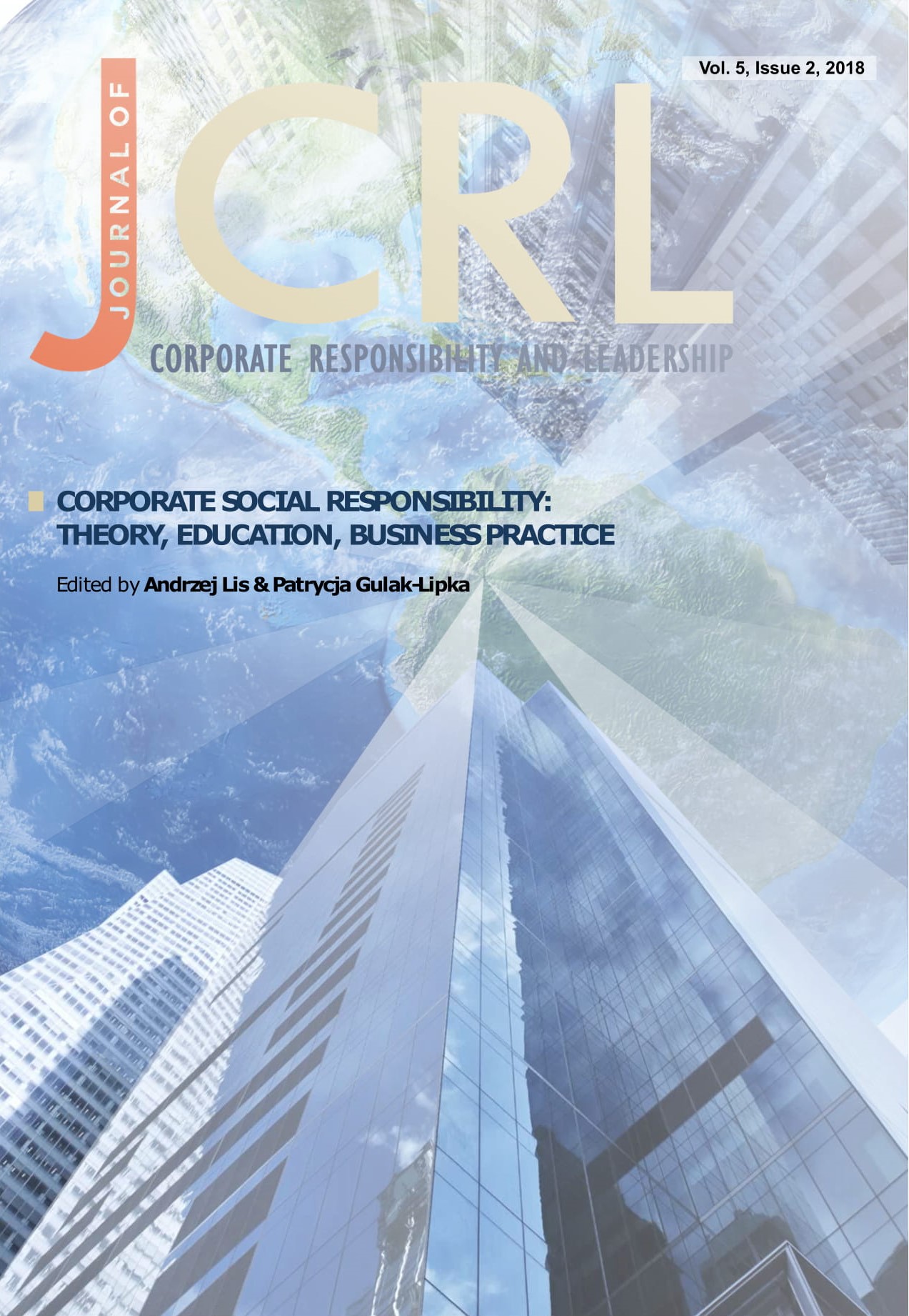Creating Shared Value – Theoretical Shortcomings and Ways to Overcome them in Practice
DOI:
https://doi.org/10.12775/JCRL.2018.013Słowa kluczowe
Creating Shared Value (CSV), CSR, developing countriesAbstrakt
In the article the concept of Creating Shared Value (CSV) is shown as a result of an ongoing debate and evolution of the idea of social responsibility of the business. The critical analysis of CSV is presented with the focus on theoretical limitations. The case of Madécasse company is described to illustrate how the weaknesses of CSV can be remedied on a practical level. Basing on the case analysis the four principles can be formulated as a preliminary list of conditions that help introducing CSV by companies: societal values presence, social goals introduction into business architecture, strong relationships with local markets, and wide cooperation net building.Bibliografia
Carroll, A.B. (1979). “A Three-Dimensional Conceptual Model of Corporate Performance”, The Academy of Management Review, Vol. 4, No. 4, pp. 497 – 505.
Cochran, P.L. (2007), “The Evolution of Corporate Social Responsibility”, Business Horizons, Vol. 50, No. 6, pp. 449 – 454.
Crane, A., Palazzo, G., Spence, L.J., Matten, D. (2014), “Contesting the Value of ‘Creating Shared Value’”, California Management Review, Vol. 56, Issue 2, pp. 130 – 153.
Dahlsrud, A. (2008), “How Corporate Social Responsibility is Defined: An Analysis of 37 Definitions”, Corporate Social Responsibility and Environmental Management, Vol. 15, Issue 1, pp. 1 – 13.
Dees, G.J. (2012), “A Tale of Two Cultures: Charity, Problem Solving, and the Future of Social Entrepreneurship”, Journal of Business Ethics, Vol. 111, Issue 3, pp. 321 – 334.
Dodd, E.M. (1932), “For Whom Are Corporate Managers Trustees?”, Harvard Law Review, Vol. 45, No. 7, pp. 1145 – 1163.
Driver, M. (2012), “An Interview with Michael Porter: Social Entrepreneurship and theTransformation of Capitalism”, Academy of Management Learning & Education, Vol. 11, No. 3, pp. 421 – 431.
Elkington, J. (1998), “Accounting for the Triple Bottom Line”, Measuring Business Excellence, Vol. 2, No. 3, pp. 18 – 22.
Emerson, J. (2003), “The Blended Value Proposition: Integrating Social and Financial Returns, California Management Review, Vol. 45, Issue 4, pp. 35 – 51.
Epstein, M.J., Yuthas, K. (2010), “Mission Impossible: Diffusion and Drift in the Microfinance Industry”, Sustainability Accounting, Management and Policy Journal, Vol. 1, Issue 2, pp. 201 – 221.
Filatotchev, I., Nakajima, C. (2014), “Corporate Governance, Responsible Managerial Behavior, and Corporate Social Responsibility: Organizational Efficiency Versus Organizational Legitimacy”, The Academy of Management Perspectives, Vol. 28, No. 3, pp. 289 – 307.
Fotaki, M., Ajnesh, P. (2015), “Questioning Neoliberal Capitalism and Economic Inequality in Business Schools”, Academy of Management Learning & Education, Vol. 14, No. 4, pp. 556 – 575.
Hart, S. (2005), Capitalism at the Crossroads: The Unlimited Business Opportunities in Solving the World’s Most Difficult Problems, Wharton School Publishing, Upper Saddle River, NJ.
Landreth, H., Colander, D.C. (2002), History of Economic Thought, Houghton Mifflin Company, Boston.
Miracle, M.P. (1970), “Comparative Market Structures in Developing Countries”, Nebraska Journal of Economics and Business, Vol. 9, No. 4, pp. 33 – 46.
Phillips, N., Tracey, P. (2007), “Opportunity Recognition, Entrepreneurial Capabilities and Bricolage: Connecting Institutional Theory and Entrepreneurship in Strategic Organization”, Strategic Organization, Vol. 5, Issue 3, pp. 313 – 320.
Porter, M.E. (1990), “The Competitive Advantage of Nations”, Harvard Business Review, Vol. 68, No. 2, pp. 73 – 93.
Porter M.E., Kramer M.R. (2002), “The Competitive Advantage of Corporate Philanthropy”, Harvard Business Review, Vol. 80, No. 12, pp. 56 – 68.
Porter, M.E. Kramer, M.R. (2006), “Strategy and Society: The Link Between Competitive Advantage and Corporate Social Responsibility”, Harvard Business Review, Vol. 84, No. 12, pp. 78 – 92.
Porter, M.E., Kramer, M R. (2011), “Creating Shared Value: How to Reinvent Capitalism and Unleash a Wave of Innovation and Growth”, Harvard Business Review, Vol. 89, No. 1 – 2, pp. 62 – 77.
Ramaswamy, V. Gouillart, F. (2010), “Building the Co-creative Enterprise”, Harvard Business Review, Vol. 88, No. 10, pp. 100 – 109.
Internet sources
Conservation International (12.12.2016), “Do Lemurs Love Chocolate? Conservation International Funds New Study to Understand Primate Use of Cacao Plantations in Madagascar”. Retrieved from http://www.conservation.org/NewsRoom/pressreleases/Pages/Do-lemurs-love-chocolate-Conservation-International-funds-new-study-to-understand-primate-use-of-cacao-plantations-in-Mada.aspx (accessed 29 May 2018).
Ennes, M. (6.03.2014), “What’s the Value of Shared Value? Shared Value Initiative”,Retrieved from https://sharedvalue.org/groups/shared-value-initiative-community/what%E2%80%99s-value-shared-value (accessed 20 May 2018).
European Commission (2011), “Communication from the European Commission to the European Parliament, the Council, the European Economic and Social Committee and the Committee of the Regions: A Renewed EU Strategy for 2011 – 14 for Corporate Social Responsibility”. Retrieved from http://ec.europa.eu/enterprise/policies/sustainable-business/files/csr/new-csr/act_en.pdf (accessed 20 May 2018).
International Monetary Fund (2015), Republic of Madagascar: Selected Issues, Retrieved from https://www.imf.org/external/pubs/ft/scr/2015/cr1525.pdf (accessed 28 May 2018).
Klein, P. (14.06.2011), “Three Great Examples of Shared Value in Action”, Forbes, Retrieved from https://www.forbes.com/sites/csr/2011/06/14/three-great-examples-of-shared-value-in-action/#6d5e4394595d (accessed 20 May 2018).
Lohr, S. (13.08.2011), “First, Make Money. Also, Do Good”, The New York Times, Retrieved from http://www.nytimes.com/2011/08/14/business/shared-value-gains-in-corporate-responsibility-efforts.html (accessed 20 May 2018).
Madécasse Impact Report (2017), Retrieved from https://madecasse.com/wp-content/uploads/2016/09/Made%CC%81casse-2017-Impact-Report.pdf (accessed 29 May 2018).
Madécasse (nd), www.madecasse.com (accessed 28 May 2018).
World Food Programme Madagascar: Country Brief (2016), Retrieved from http://documents.wfp.org/stellent/groups/public/documents/ep/wfp273029.pdf?_ga=1.153946427.2044254859. 1487514805 (accessed 28 May 2018).
Pobrania
Opublikowane
Jak cytować
Numer
Dział
Statystyki
Liczba wyświetleń i pobrań: 587
Liczba cytowań: 0



